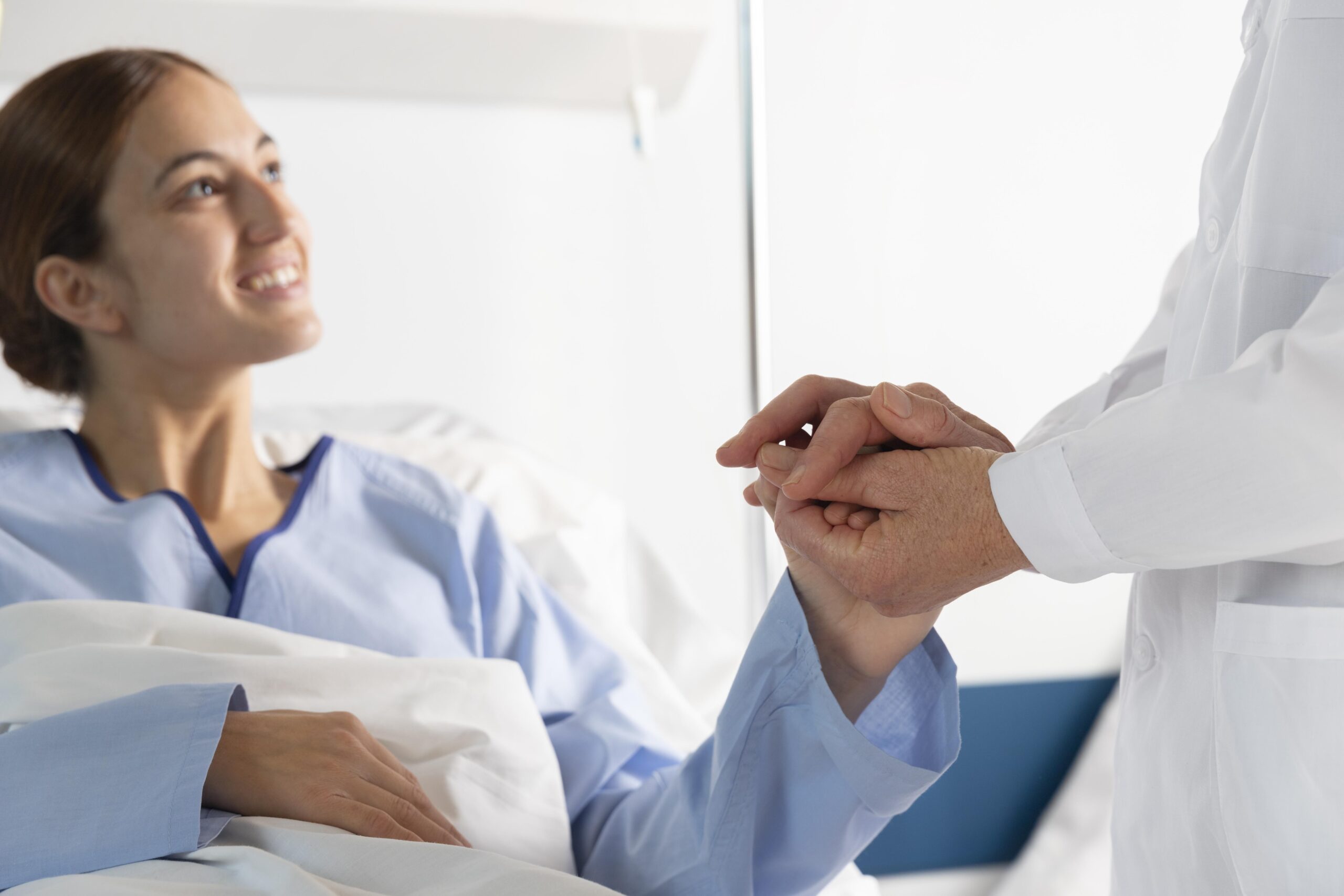Flexible Sigmoidoscopy in Dallas, TX
What exactly is a flexible sigmoidoscopy?
A flexible sigmoidoscopy is an endoscopic procedure where a long, thin, bendable tube, or “scope,” is inserted into the rectum and then progressed into the lower third of the large intestine. As indicated, the technique is somewhat limited in that the entirety of the colon will not be viewed. The scope has a light and a camera on its end which allows the gastroenterologist to analyze the colon’s lining. A sigmoidoscopy can be used to diagnose the root cause of GI symptoms including:
- Pain in the abdomen
- Loose or watery stools
- Bleeding from the rectum
- Concerning x-ray results
- As a screening tool for colon cancer and polyps.
Our providers commonly conduct flexible sigmoidoscopies for Dallas, TX patients. If you are suffering from any bothersome symptoms concerning your GI tract like those listed above, consult with a Digestive Health Associates of Texas provider near you to receive help in deciding if a flexible sigmoidoscopy could be beneficial.

What can I expect the day before my flexible sigmoidoscopy?
You will be provided with instructions from your provider regarding the necessary prep to get you ready for your exam. The majority of patients will be instructed to consume only clear liquids for the entirety of the day, the 24 hours prior to the procedure. There are several different options for laxatives to clean out the colon. It is of the utmost importance that you adhere to the directions given to you by your Digestive Health Associates of Texas provider. There will also be additional directions relating to any medicine you are currently taking. In most cases, your medications can be taken as usual. However, in some cases, specifically in patients taking blood thinners (i.e. Plavix®, Coumadin®, warfarin, aspirin, anti-inflammatories) and in those with diabetes, individual instructions will be provided. You will be directed to take nothing orally any later than midnight other than medications.
What happens on the day of my flexible sigmoidoscopy?
You will be directed to enter the endoscopy center 1 – 1.5 hours prior to your flexible sigmoidoscopy exam. This is to allow you adequate time to complete all forms and prepare for the procedure. You’ll be told to change into a medical gown. The majority of the time, an intravenous (IV) catheter will not be started since, in general, sedation is not given with this procedure. You may be connected to equipment that will allow the staff and provider to watch your oxygen levels, heart rate, electrocardiogram, pulse, breathing, and blood pressure throughout the procedure and for a period of time afterward.
Once in the exam room, you’ll be directed to lie down on your left side on the exam table. The gastroenterologist will perform an exam of your rectum. The sigmoidoscope will then be slowly inserted just inside the rectum. The scope will be slowly advanced through the sigmoid colon. A tiny amount of air is inserted by way of the scope into the colon to assist in the physician’s visualization. Any fluid remaining in the colon post preparation can be washed and removed by the scope. Depending on the results of the exam, a number of complications can be taken care of at the time of the exam including removal of polyps, control of bleeding, and biopsies. At the conclusion of the exam, all possible remaining fluid and air are suctioned out of the colon by way of the scope. Depending on the results, the exam typically takes 5 – 15 minutes.
Since anesthesia is not generally required, after the procedure is finished, the patient is told to change back into their clothes and is discharged from the endoscopy center. Assuming sedation is not needed, you’ll be permitted to drive and perform your usual activities. The majority of patients are able to eat and drink normally following their release from the endoscopy unit, however, individualized instructions in regard to activity, eating, and medications will be given to you before discharge. Following the exam, the doctor and/or nurse will go over the results of the exam with you. The patient will also go home with a written report. You will be informed of any results from biopsies in 7 days or less by your Digestive Health Associates of Texas provider.
What are the risks of a flexible sigmoidoscopy?
In general, sigmoidoscopy is a very safe test. All in all, negative side effects are experienced by fewer than 1% of patients. Most of the time, complications are not life-threatening, still, in the rare event of a complication, hospitalization and surgery might be required. Before the exam, a consent form will be reviewed with the individual by the staff. Should any questions or concerns come up, these may be brought up and explained by your provider before the procedure.
Bleeding could occur with the removal of polyps and biopsies. To reiterate, significant bleeding which might necessitate a blood transfusion or hospitalization is extremely uncommon. Still, bleeding may occur at the time of the procedure or up to two weeks after the procedure in the case that a polyp is removed.
Perforation or puncture of the colon may occur. This can be recognized at the time of the exam, or it may not be obvious until a short time later. In the majority of cases, a puncture will necessitate hospitalization and surgery. This is an unusual complication, even in the event that polyps are excised. It is of the utmost importance that you inform your provider’s office immediately if symptoms arise following the exam like growing abdominal pain, fever, or bleeding.
As with any other test, a sigmoidoscopy is not always without error. There exists a slight, accepted chance that abnormalities including cancer and polyps can be missed during the exam. It is important to continue to follow up with your providers as directed and inform them of any new or ongoing symptoms. Please consult with your Digestive Health Associates of Texas provider should you think of any concerns or questions.
Are there alternatives to a flexible sigmoidoscopy?
In most cases, the alternatives to the procedure will be dependent upon the cause of needing to undergo the sigmoidoscopy in the first place. There are several x-rays that can look at the colon including a barium enema or virtual CT scan. These methods are however diagnostic exams only. Treatment of any identified abnormalities will necessitate colonoscopy, surgery, or sigmoidoscopy. To discover more about flexible sigmoidoscopy in Dallas, TX, or about any alternatives for treating and diagnosing your condition, we suggest you contact the GI specialists of Digestive Health Associate of Texas.
Flexible Sigmoidoscopy FAQs
How accurate is flexible sigmoidoscopy in detecting colon problems?
Flexible sigmoidoscopy is a valuable diagnostic tool for identifying conditions in the lower colon, such as polyps, cancers, and inflammatory bowel disease. However, it is limited to inspecting just the sigmoid colon and rectum, meaning issues in the upper part of the colon may go undetected with this procedure. For a comprehensive evaluation of the entire colon, a colonoscopy may be recommended.
How often should I have a flexible sigmoidoscopy for colon cancer screening?
The recommended frequency of flexible sigmoidoscopy for colon cancer screening depends on individual risk factors, including age, family history of colon cancer, and personal health history. Typically, for those at average risk, it is suggested to undergo a flexible sigmoidoscopy every 5 to 10 years, beginning at age 45. Your doctor will offer personalized recommendations tailored to your unique circumstances.
What should I do if I experience symptoms after a flexible sigmoidoscopy?
After undergoing a flexible sigmoidoscopy, it’s normal to experience mild symptoms like bloating or gas. However, should you encounter more severe symptoms like persistent pain, heavy bleeding, or fever, it’s important to contact your healthcare provider immediately. Such symptoms could signal complications like perforation or severe irritation, which necessitate urgent medical care.

